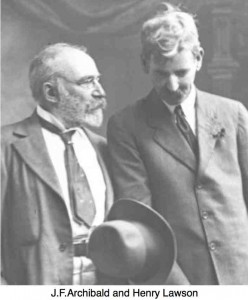The Real Lawson… Report from The Inaugural Premiere “Looking for Lawson”
By Quentin Cockburn
An opportunity arose to accompany my friend and composer John Thorn on a journey to Bourke in celebration of Lawson’s work. Apocryphally, Lawson was sent there in the sumer of 1893 by his frustrated editor J. F. Archibald, editor of the nationalist, republican, socialist, racist, and popular Bulletin, to dry out.  That was Archibald first mistake. Bourke then had nineteen hotels, and those were the official grog shanties. As evidenced by the shards of whiskey, beer, schnapps and porter bottles that glint from every ruin, sand bar, and wasteland, that refreshment was to be had in plenty, and when the rivers dried, thirst could still be slaked. Lawson, it goes, had a terrible thirst. And there is a truism borne by evidential and the anecdotal: the dry outback is not the place to go if you have an unquenchable thirst.
That was Archibald first mistake. Bourke then had nineteen hotels, and those were the official grog shanties. As evidenced by the shards of whiskey, beer, schnapps and porter bottles that glint from every ruin, sand bar, and wasteland, that refreshment was to be had in plenty, and when the rivers dried, thirst could still be slaked. Lawson, it goes, had a terrible thirst. And there is a truism borne by evidential and the anecdotal: the dry outback is not the place to go if you have an unquenchable thirst.
Lawson said the outback started at Bourke, and I suppose he was right. It is out there, but it’s also a window into something else, perhaps our souls, or the realities of subconscious and unresolved thoughts we carry with us, about aboriginality, mining, exploitation, and the stillness of a land ravaged by over exploitation, and now depopulated. There are half as many as there used to be in Bourke, or in a polite way the movers and shakers have moved on, leaving those who for whatever reason have stayed. Perhaps that’s why they need thirty police to service the population of twenty-five hundred, because the true locals refuse to go away. Elsewhere the sites of former towns, hotels, sheds, outhouses, are erased from memory. I suppose that’s what the outback does, it constantly reasserts the anonymity of timelessness, and the things that are best forgot.
So what of Lawson? I boned up on his ouvre, ‘figuratively’ I hasten to add. He was there for about six months. He got off the train with his one way ticket and the five pounds Archibald had advanced to him, and made his way to several hotels to establish himself until his funds ran out. He then took on some work at the local newspaper, the Western Herald and found odd jobs as a general hand, working on the union strike, and penning the odd short story about the place, its people and the landscape. He liked the Heidelberg painters, and like them, was more or less content with feeding the bush mythology from the comfort of the coastal cities. Where credit is due Lawson, for one reason or another, he strayed into the bush for a little longer. It had a lasting impact upon him, and propelled him in one way or another to London several years later, with one hundred pounds gifted by the Governor of NSW, and the best wishes from friends and contributors alike. Eternally, recognition for any artist is assured though acceptance in London, then and still the epicentre. The cultural cringe, colonialisms triumph, still rules over all of us in this unfinished country. And in the great tradition of artists, Lawson failed. Returning cowered, chastened, and an enigmatic figure.
Perhaps this was what Lawson found in Bourke. The more I heard the more I gained an inkling to some eternal truths and cliches. I understand Lawson’s work, but I realised that the cliches about this country, and Maccas, “Australia all Over’ persist to this day. What I did not know that after the premiere of John’s cycle, “ Looking for Lawson”, we’d witness the tradition of Bush balladeering and come to know, in the shared room at the Port of Bourke Hotel just a little bit too much of ourselves. Bad art is always best avoided, but bad poetry sinks though the skin, with a bed bug persistence. Gladly I can report there were no parasites, but a persistence in doggerel that says much about ourselves. He died ninety two years ago, bereft, broke, and boozed, writing copy for advertisements, anything to keep up the cash flow as his life literally oozed out of him. Killed by Copy! A working mans death perhaps not ‘more blood upon the wattle’, but atrophy on the typewriter.
To Be Continued
